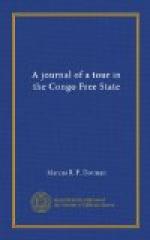At present the difficulty of transport chiefly affects the comfort of the officials for their stores of food may be delayed for some weeks and although it is possible to live on kwanga, goats and chickens, it is not a suitable diet for Europeans. Less difficulty is experienced with the exportation, for the rubber and ivory are always travelling down the hill towards the mouth of the river. Baron de Rennette fully realises how extremely important it is to have good food in this exhausting climate and took his native cook to Europe to receive some lessons in the culinary art. He has been rewarded for his trouble and now lives almost as well as he could at home. Good food, indeed, is almost as necessary in Africa as pure water. After a hard day’s work in this climate it is impossible either to relish or to digest goat’s flesh or tough chicken and the result is weakness followed by fever, anaemia or dysentry. When travelling it is still more difficult to obtain properly cooked food, and it was thus especially pleasant to find oneself dining off a clean white cloth with clean silver, hot plates and food cooked and served in a manner which would have been a credit to a London club.
There is a good path to Bima and Bomokandi and I was thinking of taking this ten day’s walk when an attack of fever caused me to change my plans again. While still at Buta Mgr. Derikx arrived. He was on a tour of his diocese and expected to be travelling for a year. I was very pleased to see him and was bound to confess that all he had told me of the Congo on the voyage out was strictly accurate. Having recovered from the fever and on the recommendation of Baron de Bennette, commenced a course of arseniate of soda, I left Buta on November 28th in the Milz. The small steamer rapidly descended the river for the water was now falling rapidly. Many crocodiles had ascended this small river to lay their eggs and were lying on sandbanks but we travelled so quickly that it was impossible to shoot them. Near Buta is one of the villages constructed for and by old soldiers and, like the rest of these institutions, this one is very well arranged and kept forming a striking contrast to the ordinary native village. It is indeed extraordinary how the savage can be changed into a civilised being by a few years of military discipline.
I reach Dzamba again on the 29th and continue the journey in canoe on the next day. The current is running swiftly down the Itimbiri and after an hour we arrive at a rapid and march through the forest while the canoe descends without passengers. The river winds here very much so that although the current is very strong it is more than an hour before the canoe arrives at the village, which we reached walking, in about twenty-minutes. The journey up is very slow and tedious for the baggage has to be carried by hand along this short cut through the forest. It is therefore proposed to build a light railway to relieve the native of this task.




